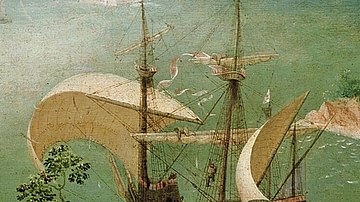Search
Did you mean: Empire?
Search Results

Definition
Egyptian Empire
The Egyptian Empire rose during the period of the New Kingdom (c. 1570- c. 1069 BCE), when the country reached its height of wealth, international prestige, and military might. The empire stretched from modern-day Syria in the north to modern-day...

Definition
Elam - The Ancient High Country
Elam was a region in the Near East corresponding to the modern-day provinces of Ilam and Khuzestan in southern Iran (though it also included part of modern-day southern Iraq) whose civilization spanned thousands of years from circa 3200 to...

Definition
Kellogg-Briand Pact - When 63 States Signed Up for Peace
The Kellogg-Briand Pact was an agreement signed in August 1928 by 63 countries, which all promised, after the horrors of the First World War (1914-18), to regard war as an illegal instrument of national policy. Unfortunately, this sentiment...

Definition
Treaty of Tordesillas
The 1494 Treaty of Tordesillas (Tordesilhas) was an agreement between the monarchs of Spain and Portugal to divide the world between them into two spheres of influence. The imaginary dividing line ran down the centre of the Atlantic Ocean...

Definition
Ancient Persian Warfare
The ancient Persian military evolved from the earlier armed forces of the Medes which, in turn, developed from the warrior class of the indigenous people of the Iranian Plateau, the Aryan migrants (including the Persians) who later settled...

Definition
Paris Peace Conference - How WWI's Victors Reshaped the World
The Paris Peace Conference, held from January 1919 to January 1920 and attended by the victorious Allied powers, debated and agreed the terms of the peace settlement that formally ended the First World War (1914-18). As four empires were...

Definition
Carrack
The carrack (nao in Spanish, nau in Portuguese, and nef in French) was a type of large sailing vessel used for exploration, to carry cargo, and as a warship in the 15th and 16th centuries. Famous carracks include the Santa Maria of Christopher...

Definition
King George's War - When New England Colonists Captured A Powerful French Fort
King George's War (1744-1748) was the third great colonial conflict fought in North America between Great Britain and France, each side aided by their respective Native American allies. Like the previous two major colonial wars, it coincided...

Definition
Maukhari Dynasty
The Maukharis (554 CE - 606 CE) rose as a power after the downfall of the Gupta Empire (3rd to 6th century CE) in the 6th century CE in northern India. The core area of their kingdom was situated in what is now the state of Uttar Pradesh...

Definition
Treaties of Tilsit
The Treaties of Tilsit were two peace treaties signed in July 1807 by Emperor Napoleon I of France (r. 1804-1814; 1815) and the monarchs of Russia and Prussia in the aftermath of the Battle of Friedland. The treaties ended the War of the...